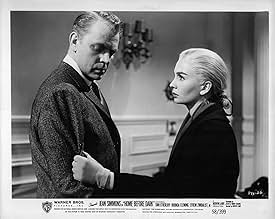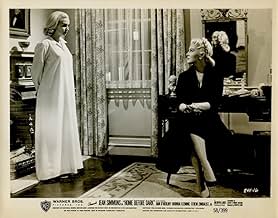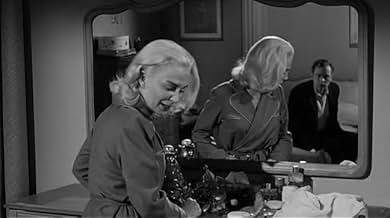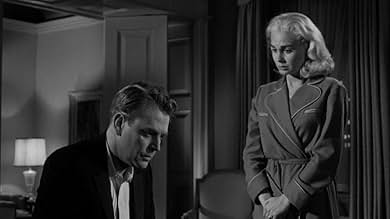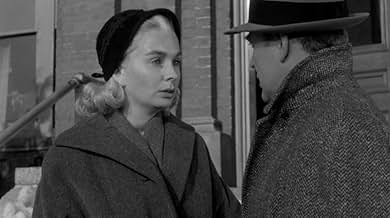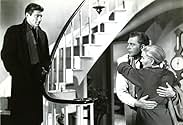AVALIAÇÃO DA IMDb
7,1/10
1,3 mil
SUA AVALIAÇÃO
Adicionar um enredo no seu idiomaSimmons is magnetic as Charlotte, her lovely, delicate face reflecting the inner turmoil of a woman battling for sanity after she walks out of a mental institution.Simmons is magnetic as Charlotte, her lovely, delicate face reflecting the inner turmoil of a woman battling for sanity after she walks out of a mental institution.Simmons is magnetic as Charlotte, her lovely, delicate face reflecting the inner turmoil of a woman battling for sanity after she walks out of a mental institution.
- Direção
- Roteiristas
- Artistas
- Prêmios
- 4 indicações no total
Stephen Dunne
- Hamilton Gregory
- (as Steve Dunne)
Walter Bacon
- Professor Dennison
- (não creditado)
Fred C. Blau Jr.
- Male Patient
- (não creditado)
Gail Bonney
- Mental Hospital Clerk
- (não creditado)
Evelyn Clarke
- Receptionist
- (não creditado)
Lillian Culver
- Mrs. Franklin
- (não creditado)
Susan Davis
- Saleslady
- (não creditado)
Avaliações em destaque
I have loved this movie since I saw it in 1958 when I was 12. I have a video copy taped from WGN in Chicago. The movie was shot around Danvers and Marblehead and Boston, Massachusetts. I grew up here and actually worked at Danvers State Hospital where the opening of the film was shot.
Jean Simmons' performance is a masterpiece! It has the feeling of real life in its depiction of depression and mental disorientation. It also points out how important one friend who believes in you can be for the emotionally wrought person. This character, Jacob Diamond, was portrayed by Efrem Zimbalist, Jr. in another overlooked fine performance. His character shows that a little kindness and understanding can go a long way.
I disagree that the film is lumbering. If someone is looking for a car chase, this is the wrong film. If one is looking for great acting and wonderful character development, this film will provide it.
Even the more minor roles are played perfectly. Rhonda Fleming is great as Charlotte's (Simmons) sister subtly wooing Dan O'Herlihy from his wife's affections.
I have seen this film many times, and each time, like a great piece of music, I see more in it.
I have never been able to find it on video. I have my copy thanks to over the air broadcasts. I taped it twice, one station inserting material that is often edited out, and dubbed it into one complete version.
I would love to hear anyone's comments, pro or con, on this film as I am fascinated by people's differing reactions to it.
Sincerely,
Peter3120
Jean Simmons' performance is a masterpiece! It has the feeling of real life in its depiction of depression and mental disorientation. It also points out how important one friend who believes in you can be for the emotionally wrought person. This character, Jacob Diamond, was portrayed by Efrem Zimbalist, Jr. in another overlooked fine performance. His character shows that a little kindness and understanding can go a long way.
I disagree that the film is lumbering. If someone is looking for a car chase, this is the wrong film. If one is looking for great acting and wonderful character development, this film will provide it.
Even the more minor roles are played perfectly. Rhonda Fleming is great as Charlotte's (Simmons) sister subtly wooing Dan O'Herlihy from his wife's affections.
I have seen this film many times, and each time, like a great piece of music, I see more in it.
I have never been able to find it on video. I have my copy thanks to over the air broadcasts. I taped it twice, one station inserting material that is often edited out, and dubbed it into one complete version.
I would love to hear anyone's comments, pro or con, on this film as I am fascinated by people's differing reactions to it.
Sincerely,
Peter3120
Charlotte (Jean Simmons) comes home from a mental hospital, shaky but game. She's been cured of all her delusions - that her husband and stepsister are having an affair, and conspiring behind her back. Except that her husband (Dan O'Herlihy) really does crave her stepsister (Rhonda Fleming) and they do talk about her in whispered tones. Even their new lodger (Efrem Zimbalist) can see it. But they deny it and she tries to deny it some more, to keep peace in the family. Finally, she can't. Is she having a breakdown or a breakout?
Admittedly, it is slow - the direction is cumbersome. But occasionally, it nails Eileen Bassing's novel with its stifling New England academic atmosphere and the rigidity of its codes. Jean Simmons was nominated for Best Actress in this role, and small wonder; it's one of her best this side of Elmer Gantry. Steve Dunne has an engaging appearance, and it's Rhonda Fleming who gets to be unsympathetic for a change.
If I could find the video, I'd buy it. But it's not for teenaged boys.
Admittedly, it is slow - the direction is cumbersome. But occasionally, it nails Eileen Bassing's novel with its stifling New England academic atmosphere and the rigidity of its codes. Jean Simmons was nominated for Best Actress in this role, and small wonder; it's one of her best this side of Elmer Gantry. Steve Dunne has an engaging appearance, and it's Rhonda Fleming who gets to be unsympathetic for a change.
If I could find the video, I'd buy it. But it's not for teenaged boys.
This is a strong drama built entirely on Jean Simmons' outstanding performance as a woman recovering from a breakdown and searching for love and a home, only to find her own strength instead. Director Mervyn LeRoy and novelist/screenwriter Eileen Bassing confidently put the entire burden on Simmons, who appears in nearly every scene, and the actress delivers a character who continually defies and exceeds the expectations of those around her, and the viewer.
We meet Charlotte Bronn as she is returning from a long stay in a mental hospital following a nervous breakdown that included episodes of violence and paranoia. She's shaky and vulnerable and painfully self-aware. But even before she first appears at the end of the long hallway, walking towards the camera and into her new life, those closest to her have already begun to let her down.
We quickly begin to learn the source of her downfall, but Simmons doesn't give us a victim and the film doesn't back away from real mental illness- the portrayal of Charlotte's recovery and gradual tilt towards relapse is surprisingly sharp and modern.
"Home Before Dark" is understated, in an almost documentary style, more smart than clever, but the energy and pacing are crisp enough that the film always seems within one twist of becoming a noir thriller or Hitchcock suspense. Charlotte is desperate for acceptance, her husband's love, and the truth about her marriage, all of which are withheld, and we naturally expect a handsome man- any of several on hand- to step forward and solve her problems, either romantically or as a confidant. The film's value comes from its steady refusal to take those easy paths.
The pathos is tastefully understated but powerful nonetheless- Charlotte says she's not beautiful, she says she knows her husband doesn't love her and that she's not worthy of love- and her husband simply fails to contradict her. The film is, among other things, a relentless study of one spouse failing another.
We root for Charlotte Bronn as she stumbles- her story never does. This is one of Simmons' best.
We meet Charlotte Bronn as she is returning from a long stay in a mental hospital following a nervous breakdown that included episodes of violence and paranoia. She's shaky and vulnerable and painfully self-aware. But even before she first appears at the end of the long hallway, walking towards the camera and into her new life, those closest to her have already begun to let her down.
We quickly begin to learn the source of her downfall, but Simmons doesn't give us a victim and the film doesn't back away from real mental illness- the portrayal of Charlotte's recovery and gradual tilt towards relapse is surprisingly sharp and modern.
"Home Before Dark" is understated, in an almost documentary style, more smart than clever, but the energy and pacing are crisp enough that the film always seems within one twist of becoming a noir thriller or Hitchcock suspense. Charlotte is desperate for acceptance, her husband's love, and the truth about her marriage, all of which are withheld, and we naturally expect a handsome man- any of several on hand- to step forward and solve her problems, either romantically or as a confidant. The film's value comes from its steady refusal to take those easy paths.
The pathos is tastefully understated but powerful nonetheless- Charlotte says she's not beautiful, she says she knows her husband doesn't love her and that she's not worthy of love- and her husband simply fails to contradict her. The film is, among other things, a relentless study of one spouse failing another.
We root for Charlotte Bronn as she stumbles- her story never does. This is one of Simmons' best.
I have seen many Jean Simmons' movies, and I thoroughly enjoyed this one.
I saw it as a young teenager on TV in Memphis, Tennessee, and it made quite an impression on me at the time. I haven't seen it since, but I still remember so many images from the movie. Not only was the acting excellent, I felt that I almost knew the characters personally. Jean Simmons was tremendous, as always. I have ordered other movies of hers, and have taped the ones from TV that I could.
The tone of the movie was also an important part of the story. As I recall, it was cold, winter, and filmed in Black and White, which gave it more of an impact. It's just occurred to me that since I saw it in b&w, I don't know if it was made in b&w, or if it was in color, since I was viewing it on a b&w TV. I think the starkness of the b&w made it very effective. I continue to look for it on TV and would LOVE to have a copy of this movie, if it ever becomes available! Donchu
I saw it as a young teenager on TV in Memphis, Tennessee, and it made quite an impression on me at the time. I haven't seen it since, but I still remember so many images from the movie. Not only was the acting excellent, I felt that I almost knew the characters personally. Jean Simmons was tremendous, as always. I have ordered other movies of hers, and have taped the ones from TV that I could.
The tone of the movie was also an important part of the story. As I recall, it was cold, winter, and filmed in Black and White, which gave it more of an impact. It's just occurred to me that since I saw it in b&w, I don't know if it was made in b&w, or if it was in color, since I was viewing it on a b&w TV. I think the starkness of the b&w made it very effective. I continue to look for it on TV and would LOVE to have a copy of this movie, if it ever becomes available! Donchu
When the film begins, you learn that Charlotte Bronn (Jean Simmons) had been in a mental hospital for a year and was ready for discharge. Oddly, it also seems as if there's been no family therapy or plans for after discharge...a bit of a mistake in the film, I think, as I cannot imagine the hospital doing this. Apparently, Charlotte's husband, Arnold (Dan O'Herlihy) also had not visited her during this year AND he has no plans on changing the family structure which existed when Charlotte lost her mind and attacked her step-sister, Joan (Rhonda Fleming). Yet, oddly, she's discharged. I think it would have made more sense having the staff argue with Arnold and mention these problems---and he checked her out against medical advice. This portion of the movie could have been constructed better.
When Charlotte returns home, you can almost instantly see what drove her off the deep end. Her step-mother (Mabel Albertson) is god- awful--a controlling know-it-all who would have probably gotten Mother Theresa to attack her after being around her more than five minutes! Albertson made a career out of playing these awful mothers...and anyone who knows 60s TV will instantly recognize her. As for the step- sister, there are hints through the course of the movie that Joan and Arnold MIGHT be carrying on behind Charlotte's back...or at least Arnold simply didn't care that Charlotte might think this. He was certainly very cold and very distant throughout the film. In many, many ways, the story seems like a primer to teach family members how to keep mentally ill loved ones mentally ill or drive them over the edge. Is there any hope for poor Charlotte and this kooky bunch? And what about the new boarder, Jake (Efram Zimbalist Jr.)?
As I was at one time a mental health therapist, I see that the film has an excellent point to make. Returning to the exact same unhealthy environment is a sure way for disaster if you have psychological or addiction issues. Changing the family or leaving them entirely when they are resistant to change is something most decent therapists would consider working on with their clients as they face discharge. Because of this, I really appreciate the movie and it talks about things rarely talked about in films about mental illness. It's often NOT just the mentally ill person that is sick but the family structure.
As far as entertainment value goes, this film is very enjoyable and late in the film you really begin to wonder what is actually happening. Is Charlotte losing her mind or is Arnold trying to drive her over the edge...or both? My only quibble (other than the one mentioned in the first paragraph) is that the film went on too long and the portion consisting of them going to visit Harvard didn't seem to quite fit with the rest of the movie. Still, very compelling and different..and the very end was great.
When Charlotte returns home, you can almost instantly see what drove her off the deep end. Her step-mother (Mabel Albertson) is god- awful--a controlling know-it-all who would have probably gotten Mother Theresa to attack her after being around her more than five minutes! Albertson made a career out of playing these awful mothers...and anyone who knows 60s TV will instantly recognize her. As for the step- sister, there are hints through the course of the movie that Joan and Arnold MIGHT be carrying on behind Charlotte's back...or at least Arnold simply didn't care that Charlotte might think this. He was certainly very cold and very distant throughout the film. In many, many ways, the story seems like a primer to teach family members how to keep mentally ill loved ones mentally ill or drive them over the edge. Is there any hope for poor Charlotte and this kooky bunch? And what about the new boarder, Jake (Efram Zimbalist Jr.)?
As I was at one time a mental health therapist, I see that the film has an excellent point to make. Returning to the exact same unhealthy environment is a sure way for disaster if you have psychological or addiction issues. Changing the family or leaving them entirely when they are resistant to change is something most decent therapists would consider working on with their clients as they face discharge. Because of this, I really appreciate the movie and it talks about things rarely talked about in films about mental illness. It's often NOT just the mentally ill person that is sick but the family structure.
As far as entertainment value goes, this film is very enjoyable and late in the film you really begin to wonder what is actually happening. Is Charlotte losing her mind or is Arnold trying to drive her over the edge...or both? My only quibble (other than the one mentioned in the first paragraph) is that the film went on too long and the portion consisting of them going to visit Harvard didn't seem to quite fit with the rest of the movie. Still, very compelling and different..and the very end was great.
Você sabia?
- CuriosidadesSince this was a film by Warner Brothers, much of the soundtrack was stock and is the same as used in their 1942 film A Estranha Passageira (1942).
- Erros de gravaçãoArnold drives Charlotte home from the hospital in a snowstorm, when plenty of snow already covers the ground. At the film's conclusion, it's New Year's Eve and Charlotte mentions that she's been home for 3 months, which means that the snowstorm happened at the end of September.
Principais escolhas
Faça login para avaliar e ver a lista de recomendações personalizadas
- How long is Home Before Dark?Fornecido pela Alexa
Detalhes
- Data de lançamento
- País de origem
- Idioma
- Também conhecido como
- Home Before Dark
- Locações de filme
- Marblehead, Massachusetts, EUA(Interior scenes and exterior scene filmed at 2 Union St. "The Layfayette House")
- Empresa de produção
- Consulte mais créditos da empresa na IMDbPro
Bilheteria
- Orçamento
- US$ 1.390.000 (estimativa)
- Tempo de duração2 horas 16 minutos
- Cor
- Proporção
- 1.78 : 1
Contribua para esta página
Sugerir uma alteração ou adicionar conteúdo ausente

Principal brecha
By what name was O Direito de Ser Feliz (1958) officially released in India in English?
Responda
